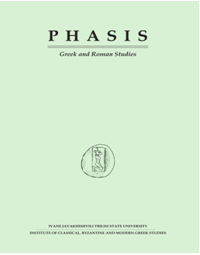Poetic Reflection of Saving and Spread of Information in Homeric Epos
DOI:
https://doi.org/10.60131/phasis.17.2014.2336Abstract
Similar to other areas of Greek culture, Homer can be considered as a teacher for the Greeks in terms of forming their attitude towards information. In this report, I discussed how far did Homer go in terms of classification of the information, defining its destination and meaning as well as ranking the types of information. The variety of formatives associated with Homer can be connected to the information such as λόγος – a word, ἀοιδή – a song, etc. However, there is one term used by Homer – ἀγγελίη – which, in certain contexts, utterly contains the understanding similar to the one meant in the term "information" from nowadays perspective. Although Homer grants several meanings to it (an information, a notification), the most important between them is the one which is most close to the term "information." Homeric epos provides the forms of saving and spread of information which are typical for the everyday life, on one hand, and which guarantees the long-term saving of the information, on the other. It is genealogical memory which saves the information on the ancestors. Basic form of granting immortality to the information is its fixation and expression through works of art and, first of all – by means of poetry. It demonstrates the importance of the culture which we can nominate as "commemorate culture" in Homeric epos, which has become essential, at first, for the ancient civilization and, later on – for the whole European civilization.Downloads
Published
2014-05-18
Issue
Section
Articles
License
Copyright (c) 2014 PHASIS

This work is licensed under a Creative Commons Attribution-NonCommercial 4.0 International License.


